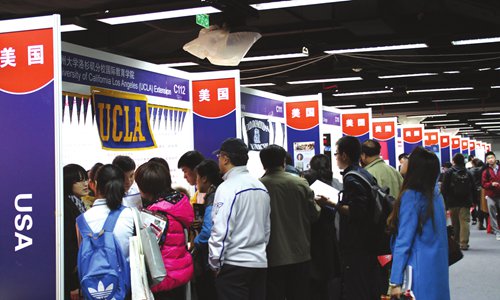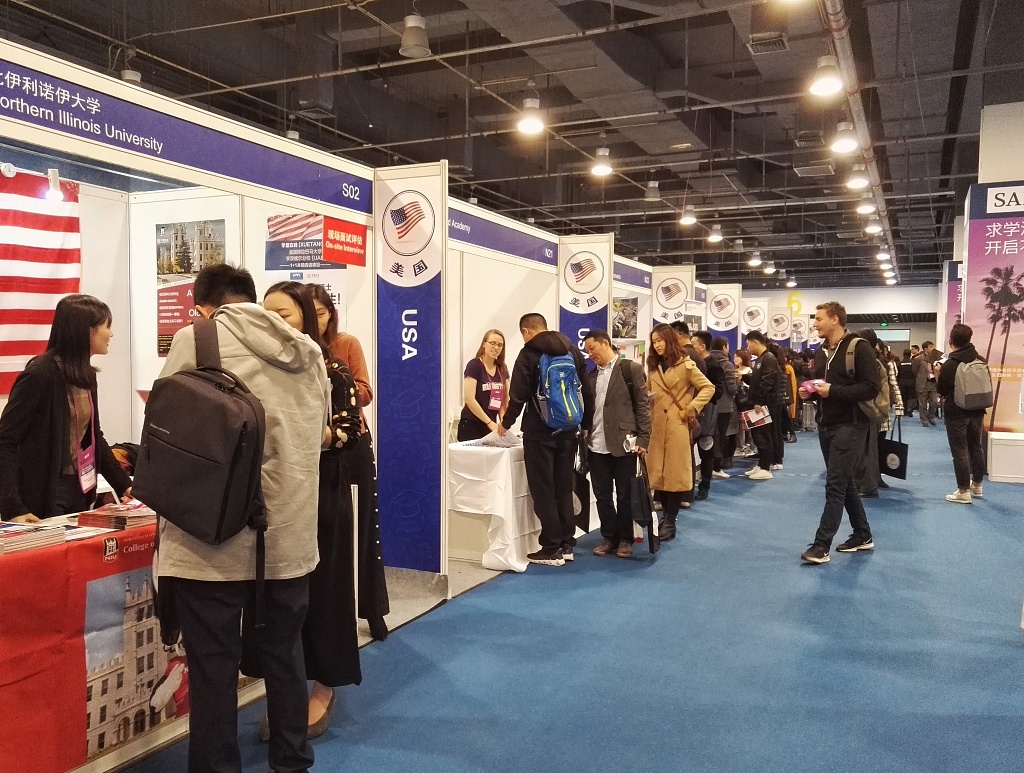It is unrealistic for the US to stop issuing student visas to Chinese nationals due to its enormous trade surplus with China in education, experts say, quelling the panic among some Chinese parents that the US may make it harder for Chinese students to get a visa.

Students line up at the China international education fair for information on studying in the United States in Beijing. (Photos: VCG)
On October 2, the Financial Times revealed that earlier this year, the Trump administration, influenced by White House hawk Stephen Miller, had seriously considered a ban on student visas for Chinese nationals out of the concern that Chinese students may carry out intelligence theft in the US.
Although according to the article, Trump did not take the suggestion in the end, the news sparked fears among some parents who plan to send their children to the US that the visa process may become tougher.
The news is the latest example of the Trump administration's attempt to limit immigration through higher education.
In May, the Associated Press reported that the US planned to launch a new policy to shorten the length of validity for some visas issued to Chinese students who are studying in fields such as robotics, aviation and high-tech manufacturing.
Education consultancies approached by the Global Times said business has so far remained stable, and student visas for Chinese citizens to the US have not been affected in recent months. "Currently, visa applications of students going to private high schools and colleges in the US are not affected. As for graduate programs, only those majoring in sensitive majors such as aerospace and space technology are somewhat affected. Even for these sensitive majors, visas will be approved after background screening is completed," Sun Zhongjie, a counsellor at Beijing-based education agency Arker International Education, which prepares students to study in American schools, told the Global Times.

Economic contribution
Experts say the enormous financial contribution Chinese students make to the US will make it impossible for the country to ban Chinese students, especially at a time when the US is launching a trade war with China.
The US enjoys a trade surplus with China in the education industry, China's central bank governor Yi Gang said at the G30 International Banking Seminar 2018 earlier this month. "A lot of Chinese students study in the US and pay large amounts of tuition fees and living expenses. This is a huge sum of money that flows from China to the US," he said.
China is the biggest source of international students for the US, according to the Institute of International Education, an independent US nonprofit organization. A report by Caixin last year shows that Chinese students who study overseas spend over 700,000 yuan ($100,900) per year per student. This is more than the median income of an average US household, at $59,039.
The contribution of Chinese students to the US economy isn't limited to the classroom only. Chinese buyers are the top foreign buyers of US residential property, and 8 percent of the homes bought by the Chinese are intended for use by a student, according to the US National Association of Realtors.
These number, combined with the statistic that Chinese purchased $31.7 billion worth of residential property that year, translates to $2.54 billion a year on housing for Chinese students in the US alone.
Wang Jueju, a Beijing-based overseas studies consultant, said the figures speak for themselves. "As one of the few industries where the US has a trade surplus with China, refusing Chinese students will lead to huge economic losses and the drain of high-level talent for the US," Wang told the Global Times.
He also said that refusing Chinese students on security grounds is ridiculous. "Due to the high legal requirement on confidentiality in academic organizations in the US, and due to stringent background checks, Chinese students and academics cannot really harm the security of US intellectual property," he said.

Not this year
Former vice commerce minister Wei Jianguo, vice chairman of the China Center for International Economic Exchanges, told the Global Times that trade friction between China and the US has not yet proliferated to the education sector, but it will be damaging to both countries once it affects overseas students.
"The trade friction will not expand to this area, not this year," Wei said.
The radical proposal to ban Chinese students has not only sparked opposition from China, but also domestically in the US.
Edward Alden, an immigration expert at the Council on Foreign Relations think tank, told the Financial Times, "The US has long attracted the lion's share of the world's most talented immigrants because they come here initially to attend the world's best universities. If we shut off that pipeline, the US will become poorer and weaker."
Geoffrey Garrett, dean of the Wharton School of the University of Pennsylvania, said in an interview with China's CGTN that migrant students play an important role in innovation in the US. "Migrants really have been the innovation engine in the US. Just look at the number of Chinese and Indian entrepreneurs in the Silicon Valley for example," he said in the interview.
According to the Financial Times article, one reason why Miller proposed the plan is that it will "hurt elite universities whose staff and students have been highly critical of Mr Trump." This sparked criticism from many of those who work in the education industry.
"Elite private universities are legitimate American non-profit organizations that should not be sabotaged by their own government, and an attack on them would catch in the crossfire, and likely do more damage to, less elite schools with smaller endowments and public universities that rely on support from their state government," Christopher Rim, CEO of US education consultancy Command Education, wrote on the Forbes magazine website.


